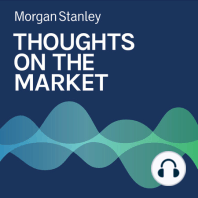3 min listen

Michael Zezas: Why are Markets Unfazed by Omicron?
Michael Zezas: Why are Markets Unfazed by Omicron?
ratings:
Length:
3 minutes
Released:
Jan 5, 2022
Format:
Podcast episode
Description
As 2022 gets underway, investors are concerned about the Omicron variant of COVID-19, yet markets are taking developments in stride, with higher stock prices and bond yields. Is this economic confidence misplaced?----- Transcript -----Welcome to Thoughts on the Market. I'm Michael Zezas, Head of Public Policy Research and Municipal Strategy for Morgan Stanley. Along with my colleagues, bringing you a variety of perspectives, I'll be talking about the intersection between U.S. public policy and financial markets. It's Wednesday, January 5th at 10:00 a.m. in New York. As we settle in for 2022, the early line of questioning from clients regards the impact of the Omicron variant of COVID 19. It's been shattering records for infections globally and in the US, disrupting air travel as workers stay home sick. So why then are markets so far this week taking this in stride? Higher stock prices and bond yields reflect more economic confidence than concern. Is that confidence misplaced? Not necessarily, in our view. That's because while Omicron is clearly a serious public health risk, the data suggests it may not trigger the level of public policy response that sustainably crimps economic activity, such as indoor capacity restrictions on service establishments or stay at home orders. Since the pandemic's onset, such responses have largely been dictated by state and local governments, and as we pointed out in this podcast a month ago, in most cases where restrictions were tightened, rising COVID hospitalizations and lack of bed capacity were cited as the culprit. So far, the data suggests hospital capacity may not be a problem with Omicron. Consider studies from the UK and South Africa, which have shown that Omicron is substantially less likely than the previously dominant Delta variant to land people in the hospital. This likelihood is lessened even more if an infected person was previously vaccinated. So even as case counts soar above those prior waves, it's not surprising to see that measures of hospital capacity stress across the US are yet to exceed those of prior waves. Further, as our colleagues in the Biotech Research team point out, the contagiousness of Omicron and subsequent protection against reinfection that the infected develop, at least for a time, has led to bigger but shorter infection waves in places like South Africa. This is why US government officials point out that Omicron could peak and fall quickly sometime this month. In short, the wave and any attendant economic risk could be over quickly, and this may be why investors are looking through it. Hence, we expect markets will refocus on inflation and Fed policy as key drivers for 2022, continuing to push bond yields higher this year in line with our team's forecast. Thanks for listening. If you enjoy the show, please share Thoughts on the Market with a friend or colleague or leave us a review on Apple Podcasts. It helps more people find the show.
Released:
Jan 5, 2022
Format:
Podcast episode
Titles in the series (100)
Mike Wilson: Are U.S. Economic Indicators Flashing Yellow? by Thoughts on the Market